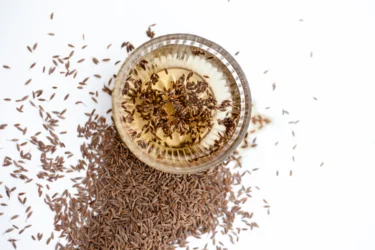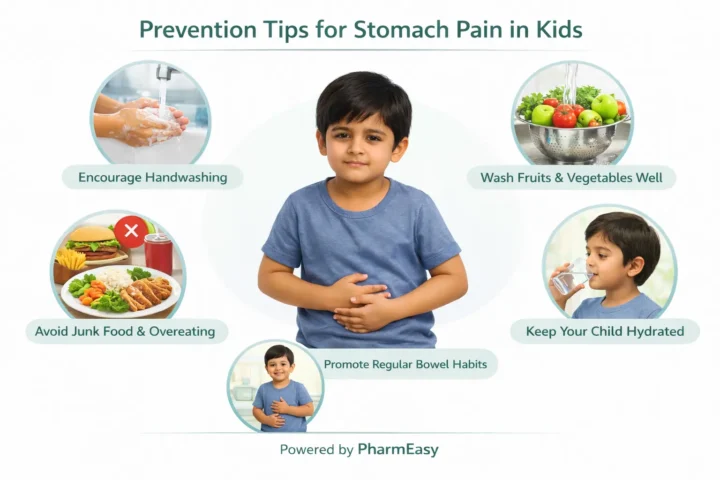Stomach Pain in Kids: Causes, Home Remedies, and Treatment Options
By Dr. Raghuveer +2 more

Get,

to manage your symptom
Get your,


4 Cr+ families
benefitted

OTP sent to 9988776655



You’ve successfully subscribed to receive
doctor-approved tips on
Whatsapp

Get ready to feel your best.

Hi There,
Download the PharmEasy App now!!


Register to Avail the Offer
Send OTPBy continuing, you agree with our Privacy Policy and Terms and Conditions

Hi There,
Sign up on PharmEasy now!!
Trusted by 4 crore+ families

OTP sent to 9988776655



You have unlocked 25% off on medicines




Code: NU25
By Dr. Raghuveer +2 more
Table of Contents
Has your child complained about stomach pain? Stomach pain is one of the most common complaints in children and is a frequent cause of doctor’s or hospital visit for children1. Most causes of stomach pain in kids are harmless (e.g., indigestion, constipation, or anxiety) and may get better in a few hours or days2. However, stomach pain in children may also be a sign of underlying serious conditions, such as appendicitis or urinary tract infection that may require prompt medical attention. It is important to recognise when to seek medical help to ensure your child’s health and safety2.
This article will help you understand the common causes of stomach pain, effective home remedies, and the different treatment options available in children.

The common causes of stomach pain include1,2:
If stomach pain does not improve over time, it may indicate a serious stomach infection, such as1,2:
While most stomach aches in children are mild and improve with simple care, some causes may need medical attention. It is always recommended that you consult your doctor if the pain is severe, persistent, or associated with fever, vomiting, blood in stools, or weight loss.
An important clinical pearl often used to distinguish serious conditions from common ones is the Apley’s Law also known by rule of navel which states that: the further the pain is from the belly button, the more likely it is to be a physical problem requiring medical attention, whereas pain centered directly around the navel is rarely surgical.
Dr. Sarthak Soni, MBBS, MD (Pediatrics)
Stomach pain is a common complaint among children. As a parent, you can try these simple, safe remedies at home to provide comfort to your child. However, these are only general soothing measures and not substitutes for medical treatment. Stomach pain in kids home remedies include1,2:

Ensure that your child drinks plenty of fluids to stay hydrated, such as water, or other clear fluids, such as juices. Also, encourage your child to get adequate rest, which can support recovery.

To relieve stomach pain in kids, you can place a hot water bottle on your child’s stomach or run a warm bath. This may help to relieve stomach cramps.

Consuming light and easy-to-digest meals may help to reduce the strain on your child’s stomach. Foods like buttermilk, ghee, bajra (millets), brown rice, curd rice, and cumin may aid in digestion4.

A stomach massage in a clockwise direction using gentle pressure can help relax your stomach muscles, which can aid in digestion. It may also help to relieve pain associated with bloating and stomach cramps5.

Light physical activity, such as walking, can help to relieve constipation or gas and, thereby, improve digestion. It is important to remember that rest is important, however, lying down for too long or performing exercises that involve lying flat may worsen bloating6,7.

This includes the use of age-old Indian home remedies, such as applying a small amount of hing (asafoetida) paste around the navel and drinking cumin (jeera) or ajwain (carom seed) water to ease stomach pain and gas8. Studies suggest9 that the use of peppermint oil may also help reduce the duration, severity, and frequency of stomach pain in children.
If the pain is severe, persistent, or associated with fever, vomiting, or diarrhoea, it is important to seek immediate medical help1,2.
Medicines for stomach pain in children should only be given under a paediatrician’s supervision. Parents must avoid self-medicating, as incorrect medicines or dosages can be harmful. A doctor may recommend the use of:
Additionally, lifestyle and dietary changes may play a vital role in relieving and preventing recurrent stomach infections. This includes1,2:
The treatment of stomach pain in children involves a careful balance between medical guidance and healthy daily habits.
Also Read: How to Stop Constant Cough in Children: Expert Tips and Tricks
Most children experience stomach pain at some point, and in many cases, it resolves on its own. You should take your child to your doctor or directly to the emergency department if your child1,2:
While stomach pain in children may resolve without serious consequences, persistent or severe pain or pain associated with any of the symptoms above, should never be ignored. Early medical evaluation helps ensure that serious conditions are treated quickly and your child stays safe.
An important clinic tip from my side on when to see a doctor is if the pain is worse at night, or if the pain awakens the child during night, it is considered as significant abdominal pain and should be considered a medical emergency unless proved otherwise.
Dr. Sarthak Soni, MBBS, MD (Pediatrics)

Stomach pain in children may be prevented by following these simple tips1,2,12:
By following these simple practices, parents can lower the risk of common stomach problems in children and promote their child’s digestive health.
Also Read: Blue Baby Syndrome in Infants: Causes, Symptoms & Treatment
Stomach pain in children is a very common complaint and, in most cases, it is mild. Such pain generally resolves with simple care, hydration, and healthy lifestyle practices. However, it is important for parents to recognise the difference between minor symptoms and symptoms that may signal a more serious underlying condition. Prompt medical attention is essential if the pain is severe, persistent, or associated with warning signs such as fever, vomiting, blood in stools, or unexplained weight loss. By practicing good lifestyle habits, promoting good dietary habits and seeking professional medical guidance when needed, parents can ensure good digestive health and the overall well-being of their child.
Also Read: Normal Body Temperature for Babies: A Complete Guide for Parents
Stomach pain in kids home remedies include giving your child clear fluids to prevent dehydration, a light diet like curd rice or bananas, warm compresses, and gentle stomach massage. Light physical activity can also help relieve gas or constipation. These are supportive measures that may help to relieve stomach pain. However, if the pain is severe or associated with fever, vomiting, or diarrhoea, it is important to consult your doctor and seek medical care immediately.
No, it is important to consult your doctor to understand what medicines should be given for stomach pain. Self-medicating can be harmful, as incorrect drugs or dosages may worsen your child’s condition. After a careful assessment, your doctor may decide if pain relievers, antibiotics, or deworming medicines are necessary and prescribe the right dose safely1,2,10,11.
Traditional Indian home remedies for stomach pain for children such as cumin water, peppermint oil, ajwain water, or hing have been used for many years to relieve stomach discomfort. However, their effectiveness varies, and they should only be used as supportive care. It is always recommended to consult your doctor and seek medical care if your child’s symptoms persist or if the pain worsens8,9.
If your child presents with persistent or worsening pain, high fever, repeated vomiting, blood in stools, severe dehydration (dry lips, no urination, lethargy), or unexplained weight loss, it may indicate serious stomach infection. It is important to consult your doctor and seek medical help1,2.
Disclaimer: The information provided here is for educational/awareness purposes only and is not intended to be a substitute for medical treatment by a healthcare professional and should not be relied upon to diagnose or treat any medical condition. The reader should consult a registered medical practitioner to determine the appropriateness of the information and before consuming any medication. PharmEasy does not provide any guarantee or warranty (express or implied) regarding the accuracy, adequacy, completeness, legality, reliability or usefulness of the information; and disclaims any liability arising thereof.
Links and product recommendations in the informationprovided here are advertisements of third-party products available on the website. PharmEasy does not make any representation on the accuracy or suitability of such products/services. Advertisements do not influence the editorial decisions or content. The information in this blog is subject to change without notice. The authors and administrators reserve the right to modify, add, or remove content without notification. It is your responsibility to review this disclaimer regularly for any changes.
Comments

Leave your comment...
You may also like
Comments